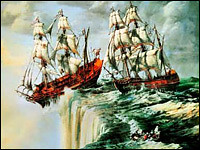the world is flat
The intersection of politics, technology and education is the subject of Thomas Friedman's new book, The World is Flat: A Brief History of the Twenty-first Century
After reading the reviews at amazon and by Doc Searls (Linux Journal) I have to get a copy
Friedman is making a number of points I agree with - rapid globablisation is a good thing, the internet is corroding and flattening all institutions, there are more opportunities emerging for the individual, there needs to be more democracy and less poverty in the world for these trends to be fully realised
Here's the best amazon review I could find:
Doc Searls has reviewed Friedman's book from an Open Source angle, Part 1 and Part 2.
After reading the reviews at amazon and by Doc Searls (Linux Journal) I have to get a copy
Friedman is making a number of points I agree with - rapid globablisation is a good thing, the internet is corroding and flattening all institutions, there are more opportunities emerging for the individual, there needs to be more democracy and less poverty in the world for these trends to be fully realised
Here's the best amazon review I could find:
Three-act structures seem to be quite fashionable in books these days, what with Jane Fonda describing her life as a three-act play in her just-published "My Life So Far" and now with New York Times foreign affairs columnist Thomas Friedman introducing the concept of "Globalization 3.0" in his newest book. Perhaps it gives readers like myself a sense of order that may not be readily apparent otherwise. According to Friedman, nation-states ruled "Globalization 1.0" until 1800, while multinational corporations dominated through the Industrial Revolution in "Globalization 2.0" until the new millennium began. He explains that the burgeoning global fiber-optic network has transcended national borders and corporate entities to the point of starting a new defining phenomenon of our economy - the outsourcing of the U.S. economy's service and information-technology work to India and other developing nations.
The result is a flattened world, a macro-level regrouping of economic forces which occur periodically on a global basis. By no means unprecedented, Friedman's treatise goes further to describe the ten forces that have decimated us in similar ways through history, including the fall of the Berlin Wall and the discrediting of Soviet-style command economies, as well as the advent of search engines like Google, most of whose queries are now no longer in English. The concept of a seemingly borderless world is hardly groundbreaking, but Friedman does make a compelling case for the great leveling going on that allows individuals worldwide to collaborate and compete on a whole new scale. Friedman thinks big. Wireless mobility, for instance, is a "mobile me" revolution that will have its "full flattening effect by freeing people to truly be able to work and communicate from anywhere to anywhere with anything."
But Friedman understands that true globalization will be limited by the rampant poverty of the third world. "You cannot drive economic growth," Friedman says, "in a place where 50 percent of the people are infected with malaria or half of the kids are malnourished or a third of the mothers are dying of AIDS." What further complicates this concept is 9/11 and the ensuing threat of terrorism that brings back the reality of national borders. Friedman's treatment of 9/11 and Middle Eastern issues is insightful, but it doesn't convincingly settle the question of whether global trade or global terror is our age's central organizing principle. Taking advantage of the Bush administration's dismissal of securing poorly guarded Russian nuclear weapons and material, the al Qaeda could buy, build or steal nuclear weapons. In such a case, the surging growth of the Indian and Chinese entrepreneurial classes seems rather incidental. As a result, the book becomes more valuable as a guide to surviving in the computer age. It provides specific steps for individuals, companies, and poor nations to adapt to a "flat world". Friedman is big on metaphors, catch-phrases like "in-sourcing" and "in-forming" and sound-bite theories like "no two nations having McDonald's have gone to war". His glibness aside, he seems to know the world around him through his extensive travels and adept observations. Highly recommended.
Reviewer: Ed Uyeshima (San Francisco, CA USA)
Doc Searls has reviewed Friedman's book from an Open Source angle, Part 1 and Part 2.





1 Comments:
Hey Bill, when I get my copy and finish reading it, I'll courier it over to you at your school.
Post a Comment
<< Home